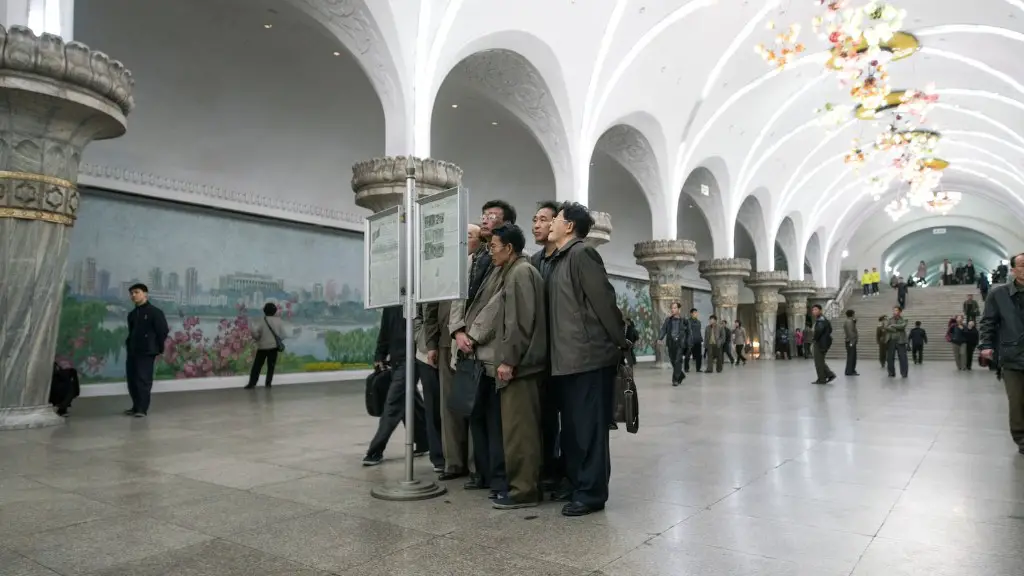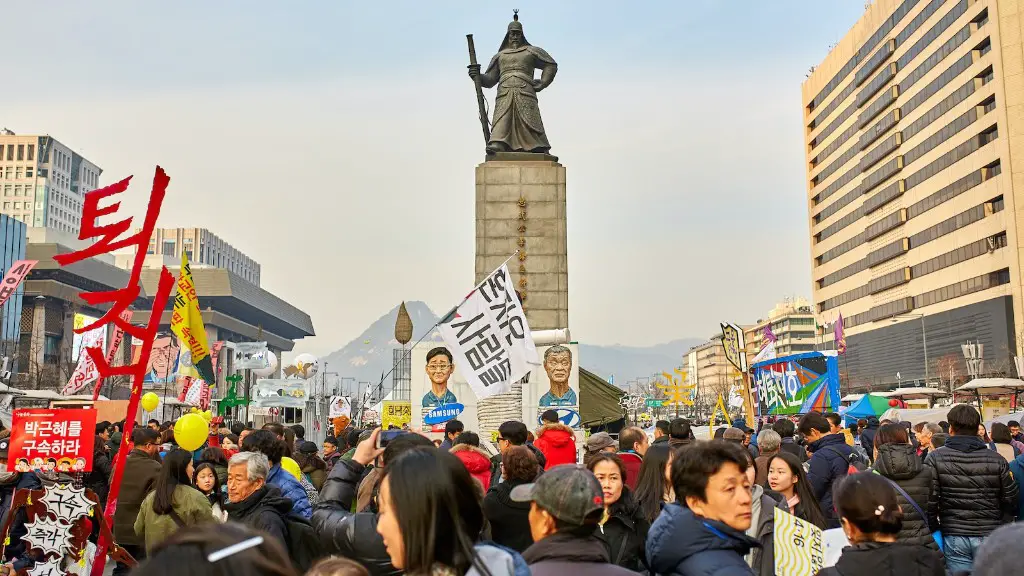Political Restrictions
North Korea is home to millions of people living with food insecurity. The main problem lies in the politics of North Korea,which has been unable to break away from its own disastrous policies. Years of domination by the single party – the Korean Workers Party – have caused the country to stagnate in terms of economic development and access to basic needs. The country’s leadership has imposed certain restrictions which have caused the people in the country to suffer from malnourishment and severe hunger. For example, the country has been unable to access food resources from other countries due to its isolationist foreign policy. As a result, the country’s people have had no choice but to rely on their own means of survival,which have been inadequate in providing them with the necessary nutrition. The government has also placed certain restrictions on the country’s citizens in terms of their right to own land, travel outside the country or make certain life decisions. As a result, even when access to food is available, many citizens are unable to access it due to these restrictions.
Poor Agricultural Systems
The second problem facing North Korea is its poor agricultural systems. North Korea’s land is mostly mountainous, leaving a limited amount of land suitable for farming. Coupled with outdated farming techniques, the country cannot produce enough basic crops to sustain its population. The government also does not allow for foreign imports of food, and so the country’s food security is further reduced. In addition, the country’s soil has become extremely depleted due to the inefficient farming techniques being used. This has caused those who rely on small-scale subsistence farming to struggle in gaining enough food to feed their families, leaving some people in extremely desperate situations.
Lack of Quality Healthcare Systems
North Korea also lacks in quality healthcare systems. This has been a major contributing factor to the food insecurity crisis in the country. There is limited access to proper medical care in the country, leading to increased susceptibility to diseases and decreased nutrition. Many of the country’s hospitals and clinics are in poor condition, and a lack of resources have lead to a decrease in the quality of care provided. Moreover, the country has been unable to keep up with the changing technological advances in the healthcare industry, leaving the country’s citizens with limited access to treatments. This further contributes to the food crises as malnutrition leads to increased health problems.
International Embargo
The international embargo imposed on North Korea has had a major impact on the country’s food insecurity problem. Since the country has been subjected to such strict sanctions, it has become very difficult for any kind of international assistance to reach them. As a result, the people in the country have had limited access to food resources from other countries, leaving many to fend for themselves in terms of providing nutrition for their families. In addition, the international community has been very hesitant in providing aid to the country, making it extremely difficult for people to access any kind of assistance. This has caused a vicious cycle in which malnutrition has led to a decrease in health, further contributing to the food insecurity issue.
Sanctions Against Korea
In addition to the international embargo, sanctions have been imposed on the country by other countries, mainly the United States. These sanctions have caused major economic hardships in the country, further exacerbating the food insecurity issue. The sanctions have caused limited access to international aid and resources, making it extremely difficult for the country to even maintain its current situation. Furthermore, the sanctions have made it nearly impossible for any kind of international assistance to reach North Korea, causing further instability and deprivation for the country’s citizens.
Government Involvement
The government of North Korea has been unwilling to take responsibility for the food insecurity crisis. In fact, the government has actually made it worse by refusing to address the issue. The refusal to address the food insecurity crisis has caused it to worsen, as more and more people are falling into extreme levels of hunger and malnutrition. This is a major concern, as many have argued that the government is purposely allowing the crisis to worsen in a bid to maintain power and control over the country’s citizens.
Environmental Factors
Environmental factors have also contributed to the food insecurity crisis in North Korea. The country has experienced a number of natural disasters in recent years, including floods and droughts. These environmental factors have greatly decreased the amount of arable land available in the country, making it harder for people to have access to food. In addition, the country has also seen an increase in extreme weather patterns, making it more difficult for North Koreans to grow and harvest crops.
Political & Economic Challenges
The political and economic challenges facing North Korea are also adding to the food insecurity crisis. The country is highly centralized and does not have a free market economy. This has created a situation where the government is unable to adequately provide the resources needed to sustain its citizens. Moreover, the lack of economic freedom has further exacerbated the food insecurity issue, as access to resources has been limited and a number of people have found themselves in poverty.
International Aid
In recent years, there has been an increase in the amount of international aid being provided to North Korea. Despite the difficulties faced by the country, the international community has been providing aid in the form of food, medical supplies and other resources. Although there is still an immense amount of work to be done, this shows that the international community is working towards improving the situation for North Korea.
Solutions
In order to address the food insecurity crisis in North Korea, a number of solutions have been proposed. One solution is for the government to focus on developing more efficient agricultural systems, as this would allow them to produce more food and create more abundance. Additionally, the government should focus on improving access to healthcare, as this will reduce the high rate of malnutrition in the country. Furthermore, the international community should continue providing aid and resources to help improve the country’s situation, as well as advocating for an end to the economic sanctions on North Korea. Lastly, the government should allow for freedom of movement and access to resources, as this will allow its citizens to have a better chance at survival.
Nutritional Education
A further solution to the food insecurity crisis in North Korea is for the government to provide nutritional education to its citizens. This would help them learn about nutrition and how to best use the resources that are available. Additionally, teaching people how to grow and harvest crops in an efficient manner would help to increase food production, as well as food security. Furthermore, by providing more nutritional education, North Koreans would be able to learn about how to make the most of their resources, as well as how to make their food more nutritious.
Political & Economic Reforms
Political and economic reforms are also needed to address the food insecurity crisis in North Korea. The government must start to move away from its single-party rule, and focus on creating a more open and democratic society. By doing this, the government will be able to provide people with more access to resources, as well as create more economic opportunities. In addition, the economic sanctions imposed on North Korea must be lifted in order to give the country more access to outside resources. This will allow North Korea to become more open to foreign investment, as well as aid and resources, which in turn will help to improve the country’s food insecurity situation.
International Attention
Finally, it is imperative for the international community to continue to focus on the food insecurity crisis in North Korea. This is an issue that cannot be overlooked, as it is negatively impacting millions of people. Therefore, the international community must continue to put pressure on North Korea to address the issue, and provide assistance in the form of food and supplies. In addition, the international community must continue to advocate for an end to the economic sanctions imposed on North Korea, as this will help to alleviate the crisis and give the people more access to food and resources.



